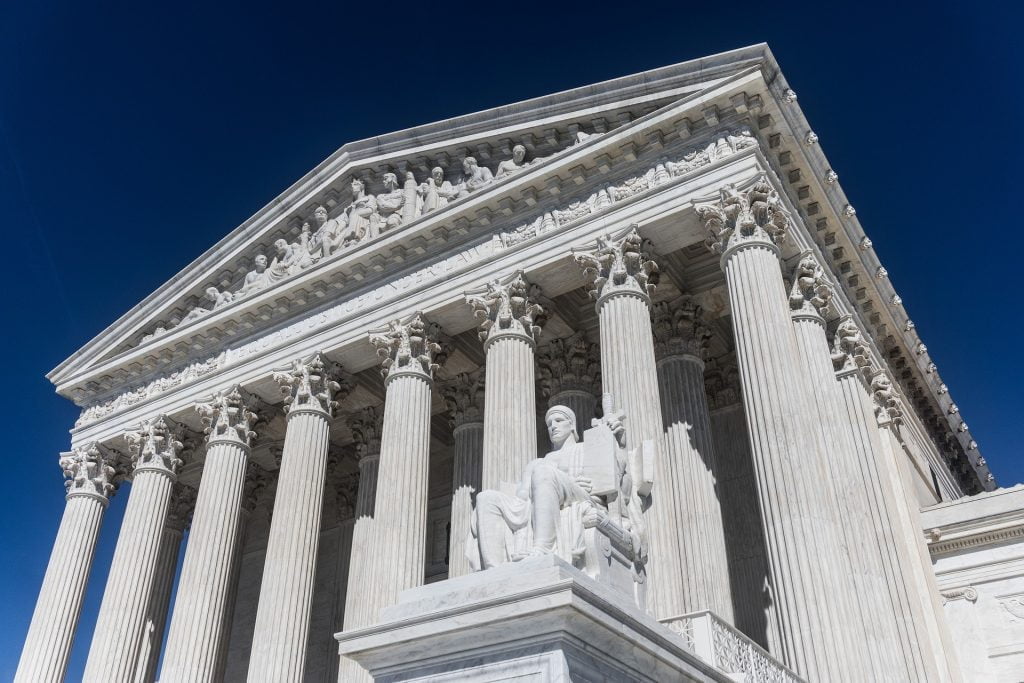In the Christian political sphere, this is a somewhat common question. What do we do about fake Christians within the Christian Nationalist movement? I have no doubt that some of the people asking this question mean well, but the nature of the question is one that is easily abused by some that intend to misunderstand. Even under the broader topic of religion, the question “What do we do about fake Christians?” is a topic that encompasses everything, from church membership to the gospel itself. Providing an answer to this question is not a task I would undertake lightly. In light of recent circumstances, however, I find the need to actually answer this question from the political side. Remember, in the realm of politics, the descriptors of a particular movement are not intended to be used as a test of orthodoxy. Conservatives, for example, are described as such because they hold to a philosophy that values preserving traditional cultural and societal norms. The conservative philosophy can be held strictly or somewhat loosely, accommodating many variations of political thought. But even though conservatism has a definition, no specific or universal test will allow someone to be “worthy” of adopting the label.
In the same way, the guide to spotting “fake” Christian Nationalists is not always a matter of definitions. There will always be some that hold to the philosophy with dogmatic fervor and others who prefer to hold the principles more broadly. Because of this, the answer I provide will not be a definitive answer. However, I hope to point to some general principles for guidance on these matters.
But principles created and used in a vacuum are only moderately helpful. To avoid this, I would offer a political “test subject” for practice: Ted Cruz. This Texas Senator recently found himself the subject of the internet’s attention after commenting on Uganda’s new anti-homosexual laws. Senator Cruz made clear in no uncertain terms that he opposed the Ugandan developments.
It is certainly unsurprising for an American politician to support the LGBT+ agenda, but what makes Cruz’s clear and forceful condemnation of Uganda’s laws so appalling is that he claims to be a Christian. Given that affirmation of Christianity necessarily precludes affirmation of homosexuality, the Texas politician portrayed acting and speaking totally contrary to what he claims to believe. The concerned citizen is left wondering: Is Ted Cruz a fake Christian?
Fake Christian (Nationalists)
Although Cruz’s recent condemnation is fresh in our memories, we would be wise to remember that this is not the first time his understanding of faith in politics has been examined. When running for president against Trump in 2016, Cruz claimed that it was not appropriate for Christian politicians to “wear their faith on their sleeve.”1https://www.cbsnews.com/news/ted-cruz-politicians-shouldnt-wear-their-faith-on-their-sleeves/ Even more confusing was the fact that Cruz had been losing the evangelical vote to Trump, a non-Christian. The Texas Senator’s attack ads on his opponent seemed to have the opposite effect in establishing his credibility. In fact, it seemed that most evangelicals were siding with Trump and questioning Cruz’s ethics.
For the average Christian voter, calling Cruz a “fake Christian” proved to be easier than deconstructing the role of his faith in his politics. After all, a real Christian would never behave unethically, right? Fast-forward about nine years, and people are once again asking that same question. A real Christian would never call God’s laws an abomination, right?
These are intriguing questions, but ultimately they are the wrong ones. Our tools for separating true from fake Christians are limited in scope. To recognize another person as a Christian, we often take into account a person’s baptism, their profession of faith, if they are living a Godly lifestyle (1 Corinthians 5:11), and if they are under a church’s authority. These principles are very difficult to apply in the civil sphere, making the assessment of a public political figure as a true or fake Christian nearly impossible. As much as I would love to have genuine Christians in public office, the questions we should be asking a potential political candidate are markedly different than the ones we would ask for church membership.
Cruz summarized his views on the intersection of his faith and politics by claiming that politicians shouldn’t “wear their faith on their sleeve.” The question at hand necessarily asks: “Do we want our Christian politicians to do this?” Do you want your politicians to self-consciously act as Christians, or do you want them to “put aside” their beliefs when doing their civil duties? Those who hold to a radical adaptation of two-kingdom theology might tell Christian politicians to avoid wearing their Christianity badge at work. Christian Nationalists, conversely, want Cruz to recognize his faith and even the Christian faith of his constituents while performing his political responsibilities. In both scenarios, Cruz’s personal profession of faith would be far less relevant to the equation, placing the focus on the Christian principles he does or does not support through his political work. This alone provides a far better guide for assessing the Christian politician instead of reducing everything to the qualities of a true or fake Christianity.
At this point, I must distinguish between Christian Nationalists and those with other political views. The simple fact of the matter is, outside of Christian Nationalism, I have no idea what Christian politicians are expected to do with their faith. Like Cruz, many evangelicals expect Christian politicians to leave their faith badge at home, but this expectation defeats the purpose of identifying the “fake Christian.” Cruz is expected to act like a real Christian in his civil affairs and simultaneously deny that his faith is integrated into his political tasks. As a Christian Nationalist, I wholly reject these expectations. They are incredibly vague and inadequate. A nebulous appeal to natural law devoid of references to Christianity is not a charge I could give to my Christian politician in good faith. Instead, I would task all Christian civil leaders to advocate and act as self-consciously Christian politicians in charge of a self-consciously Christian people. If your conception of government requires Christians to check their faith at the door, don’t be surprised when the government is no longer compatible with Christianity.
So when the average Christian asks about “fake Christians” impeding the Christian Nationalist movement, we quickly realize that the assumptions behind the question are far more important than the question itself. The question revolves around what you want a Christian politician to do rather than what you want them to be.
The Problem With Consistency
Oftentimes the subject of “fake Christians” in political discussion is accompanied by questions regarding denomination. “Does politician [X] go to a fake church like the PCUSA or the UMC?” If the politician in question goes to a fake church, then the evangelical voter finds themselves in no real dilemma; a fake church produces fake Christians. However, the problem with this method is that our Ted Cruz example seems to defy it. Although I am not sure of his current standing, as of 2020, Cruz was a member of an SBC church in Houston.2https://houstonsfirst.org/news-stories/real-life-real-people-sen-ted-cruz The SBC faith and message document of the church explicitly affirms that all Christians should oppose homosexuality. It further clarifies that “Every Christian should seek to bring industry, government, and society as a whole under the sway of the principles of righteousness, truth, and brotherly love.”3Baptist Faith & Message 2000 – https://d6p4hc1w7pknl.cloudfront.net/HFBC-Baptist-Faith-and-Message.pdf?mtime=20150908093134 By opposing Uganda’s anti-homosexuality laws, Cruz clearly contradicts the teachings of his church. By advocating for the LGBTQ agenda, he unquestionably promotes evil, denying the principles of righteousness, truth, and brotherly love. While Cruz definitely caught our recent attention, it should be clear that he is not an isolated case.
In November 2022, Hillary Scholten was noticed by World magazine for her divisive and contradictory stance on abortion. Scholten, currently a Michigan senator, had been promoting herself with pro-murder campaign materials and anti-life slogans despite the fact that she was a member of a pro-life church.4https://wng.org/roundups/dutch-reformed-and-pro-abortion-1667338232 In fact, her church denomination (the CRCNA) specifically calls Christians to “speak out against the atrocity of abortion, to promote action and legislation that reflect the teaching of Scripture regarding the sanctity of human life…”5https://www.crcna.org/welcome/beliefs/position-statements/abortion Like Cruz, Senator Scholten’s clear rejection of her own church’s teachings causes quite the complication – one that the Catholic church feels on a regular basis. Despite Catholicism’s clear teaching on abortion, denying communion to those advocating for murder has been a practice inconsistently applied, at best.6https://www.forbes.com/sites/annakaplan/2022/05/24/pelosi-joins-biden-kerry-giuliani-and-other-catholics-threatened-with-no-communion-because-of-abortion-support/
Given all these examples, we must once again approach the “fake Christian” conversation again, this time with a bit of caution. When Cruz called God’s law an abomination and advocated for sexual perversion, when the church takes no disciplinary action in response, giving implicit approval to such godless advocacy, are we, out of logical necessity, required to say that Ted Cruz is a member of a fake and apostate church? After all, how can a “fake Christian” be a member in good standing at a real church? While Cruz’s statements are easy to criticize, what about cases that aren’t explicitly against God’s laws but genuinely appear to allow for evil? Would the politician then only be a “kinda fake Christian?” I am sure some of you are prepared to tackle these questions, but I think you will find the discussion unproductive. No doubt, church discipline has proven to be an often neglected duty for today’s church. But well-applied church discipline would likely only prevent the most egregious cases. From what I can tell, the system of identifying true and fake Christians along with true and fake churches using political advocacy assessments is a simply untenable and ultimately unhelpful method.
Calling Our Leaders Rightly
If we use a Christian political action as a test of orthodoxy, we will find ourselves condemning entire denominations in short order. Like the men who constantly quarrel over whether so-and-so is a true Conservative, Christians arguing about whether or not a particular politician is a true Christian bring very little value to the table. Even though Cruz’s recent tweet rejects God’s perfect law and advocates for one of the evilest societal perversions in our time, the conversation is only furthered by discussing what a Christian politician would do, not by discussing what he is.
For Christian Nationalists, politicians are encouraged to acknowledge and use God’s law. The Bible makes plain, even to the common man, what is good and evil. While Cruz was scrubbing his faith off his proverbial sleeve, trying to find the correct balance of religion and politics, Christian Nationalists opened their Bible and used it. Even a simpleton can read Leviticus 20:13 and understand that LGBT+ advocacy is not an option for anyone, let alone a Christian politician. Calling our civil leaders to promote and defend Christianity is the first step to reforming our nation. If we cannot call on our leaders to obey the true God, we should not be surprised when they listen to a false one.
If you are still prone to fixate on identifying the hypocrisy of Christians in our civil sphere, I would strongly urge you to reconsider the question. While personal lives and professions do matter, we should seek to reframe the arguments. Think about what a Christian leader of a Christian people ought to do in his duties. Too often, we ask Christians in the civil sphere to approach politics with numerous conflicting visions. Some are encouraged to hide their faith, appeal only to natural law, or focus on “winning” the secular world’s opinion. Instead, we must encourage our leaders to submit themselves to God and His morality, furthering our earthly and heavenly good in Christ.
Sources:
- 1
- 2
- 3Baptist Faith & Message 2000 – https://d6p4hc1w7pknl.cloudfront.net/HFBC-Baptist-Faith-and-Message.pdf?mtime=20150908093134
- 4
- 5
- 6





Leave a Reply